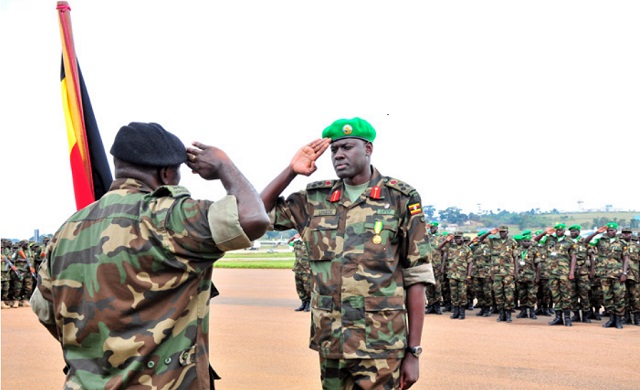
The fallen Deputy Police chief was one of the President’s most trusted lieutenants but he had an improbable task
Kampala, Uganda | IAN KATUSIIME | When Maj. Gen. Paul Lokech was appointed Deputy Inspector General of Police, he sought advice from someone close to State House on how to approach his completely different assignment. “This is not a military problem. It is a political one. Approach it that way,” he was told.
The death of Gen. Lokech on Aug. 21, a rising star in the Uganda People’s Defence Forces (UPDF), leaves President Yoweri Museveni in a dilemma, because of the acrimonious relationship he has had with the Police- a force he derides at whim.
With the absence of a de facto IGP, the President may, once again, have to make a major decision soon on filling one of the most important positions in his government. The demise of Lokech also leaves security more vulnerable with the new spate of killings haunting Masaka.
One of the most notable things following the death of Gen. Lokech was the silence of Museveni on the matter. Museveni later released a statement just after Lokech’s body was lowered into the ground. The Commander-in-Chief euologised Lokech and remarked that the fallen soldier had assisted in operations against Alice Lakwena, a rebel leader based in northern Uganda, at the time he joined the army.
As the President brewed over the matter, attention was again drawn to the Uganda Police Force whose leadership has once again been thrown in an apparent vacuum. The IGP, Martins Okoth Ochola, a career police officer understands his position in Museveni’s set up of the security apparatus. Ochola was appointed in March 2018 with then Brig. Sabiiti Muzeyi as his deputy.
Ochola appeared in charge for a few months until Sabiiti started making major calls in the force.
Lokech took over from Maj. Gen Sabiiti in December 2020 and for many, Lokech, was the man running the Uganda Police. A day before he died, Lokech had effected sweeping transfers that affected senior officers at the rank of Commissioner of Police. It also affected senior officers like Regional Police Commanders.
However, the transfers were reversed just hours after Lokech died, according to a military source familiar with the workings of the Police. The source added that by the fifth day, no officer at the level of Director had been to Lokech’s home to condole with the family.
The strange death of Lokech just after eight months in the position takes Museveni back to the drawing board. The President’s cold relationship with the police has puzzled observers.
For a long time though, Museveni has relied on the police more often than not for his survival. Whether it is quelling demonstrations in the city or reining in stubborn opponents, the Police have always been the most potent tool for the 76-year-old leader. The day Museveni appointed Lokech to Police, the brief was clear: smash any smattering of trouble that rears its head.
Gen. Lokech replaced Gen. Sabiiti Muzeyi at a politically explosive time in Uganda. Museveni was irked by the way Sabiiti handled the protests of November 2020 where more than 60 Ugandans were senselessly shot dead by the police.
Museveni’s reaction was confusing because police has always killed people when dispersing protests.
Some estimates put the number of those killed in the November protests in hundreds. This was during the presidential campaign where opposition leader Bobi Wine was challenging the 35 year reign of Museveni.
The Police arrest of presidential candidate Bobi Wine in Luuka, eastern Uganda, on charges of violating covid19 guidelines while campaigning triggered unrest countrywide.
Protests gripped Kampala and angry youth in their thousands staged demonstrations bringing the city to a grinding halt. According to some sources, Sabiiti together with Chieftaincy of Military Intelligence (CMI) and Internal Security Organisation (ISO) had decapitated informal structures put in place by former Police boss Gen. Kale Kayihura thus enabling the mobilisation of angry urban and discontented youth into wild fire protests.
However the reality was that an arrest of Bobi Wine, running an improbable presidential campaign with a mammoth following, was bound to galvanise fiery protests regardless of who was running the police and the tactics they deployed.
 The Independent Uganda: You get the Truth we Pay the Price
The Independent Uganda: You get the Truth we Pay the Price


